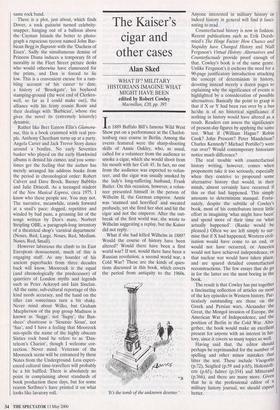The Kaiser's cigar and other cases
Alan Sked
WHAT IF? MILITARY HISTORIANS IMAGINE WHAT MIGHT HAVE BEEN edited by Robert Cowley Macmillan, f20, pp. 395 In 1889 Buffalo Bill's famous Wild West Show put on a performance at the Chariot- tenburg race course in Berlin. Among the events featured were the sharp-shooting skills of Annie Oakley, who, as usual, called for a volunteer from the audience to smoke a cigar, which she would shoot from his mouth with her Colt 45. In fact, no one from the audience was expected to volun- teer, and the cigar was usually smoked by the lady's long-suffering husband, Frank Butler. On this occasion, however, a volun- teer presented himself in the person of Wilhelm II, the German emperor. Annie was 'stunned and horrified' and sweated profusely, yet she fired her shot and hit the cigar and not the emperor. After the out- break of the first world war, she wrote to Wilhelm suggesting a replay, but the Kaiser did not reply.
What if she had killed Wilhelm in 1889? Would the course of history have been altered? Would there have been a first world war? If not, would there have been a Russian revolution, a second world war, a Cold War? These are the kinds of ques- tions discussed in this book, which covers the period from antiquity to the 1960s.
`Its the tomb of the unknown deserter.' Anyone interested in military history or indeed history in general will find it fasci- nating to read.
Counterfactual history is now in fashion. Recent publications such as Erik Dursh- mied's The Hinge Factor: How Chance and Stupidity have Changed History and Niall Ferguson's Virtual History: Alternatives and Counterfactuals provide proof enough of that. Cowley's book is of the same genre. Unlike Ferguson's it eschews the need for a 90-page justificatory introduction attacking the concept of determinism in history, devoting instead merely a dozen pages to explaining why the significance of events is highlighted by a consideration of possible alternatives. Basically the point to grasp is that if X or Y had been run over by a bus he/she is of no historical significance if nothing in history would have altered as a result. Readers can assess the significance of present-day figures by applying the same test. What if (William Hague? Robin Cook? John Prescott? Peter Mandelson? Charles Kennedy? Michael Portillo?) were run over? Would contemporary historians notice much difference?
The real trouble with counterfactual history writing, however, comes when proponents take it too seriously, especially when they contrive to propound some alternative history that would, in their minds, almost certainly have occurred if this or that had happened. This simply amounts to determinism manqué. Fortu- nately, despite the subtitle of Cowley's book, most of his contributors invest little effort in imagining 'what might have been' and spend more of their time on 'what actually happened'. (Ranke would be pleased.) Often we are left simply to sur- mise that if X had happened, Western civil- isation would have come to an end, or would not have occurred, or America would not have achieved independence, or that nuclear war would have taken place, and are spared detailed counterfactual reconstructions. The few essays that do go in for the latter are the most boring in the book.
The result is that Cowley has put together a fascinating collection of articles on most of the key episodes in Western history. Par- ticularly outstanding are those on the Greek and Persian wars, Alexander the Great, the Mongol invasion of Europe, the American War of Independence, and the position of Berlin in the Cold War. Alto- gether, the book would make an excellent present for anyone with an interest in his- tory, since it covers so many topics so well. Having said that, the editor should perhaps be reprimanded for the number of spelling and other minor mistakes that litter the text. These include Visogoths (p.72), Seigfied (p.59 and p.65), Holenzoll- ern (p.65), fuhrer (p.354) and Mitterand (p.366), and there are many more. Given that he is the professional editor of a military history journal, we should expect better.


























































 Previous page
Previous page